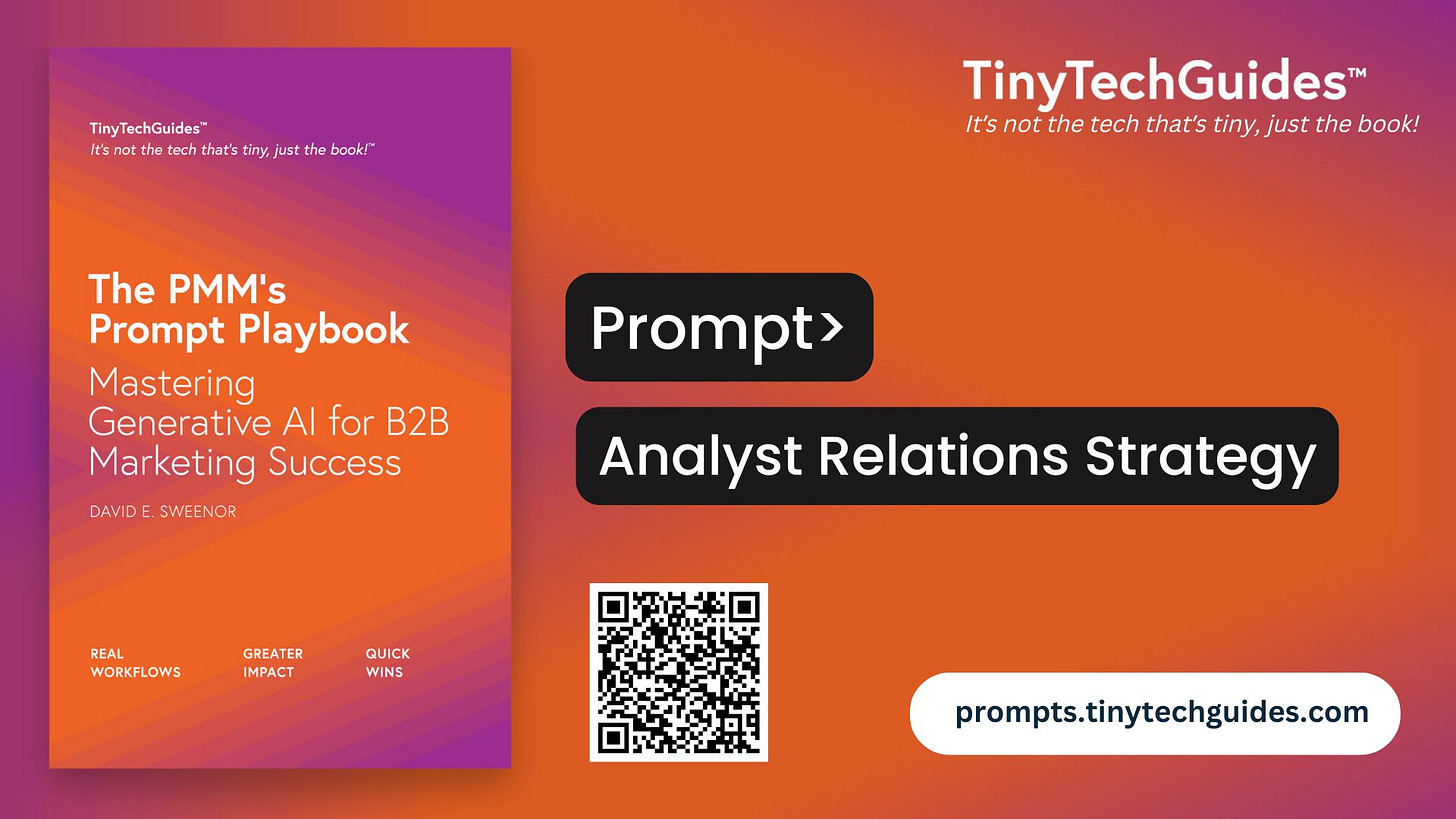Build a Repeatable Analyst Relations Strategy
A step-by-step workflow to align your messaging, secure favorable coverage, and strengthen market credibility.
Analyst Relations Workflow
Created by prompts.tinytechguides.com
This prompt is not part of The PMM’s Prompt Playbook which has 30 ready-to-use prompts. If you're looking for more cut-and-paste prompts, join the Substack! Paid subscribers receive new cut-and-paste prompts every week.
Get the PMM’s Prompt Playbook and Modern B2B Marketing today!
Need help with product marketing or prompts? Let me know.
What This Workflow Does
This workflow helps B2B marketers and comms pros build a repeatable Analyst Relations strategy that aligns company messaging with analyst priorities, secures favorable coverage, and supports market credibility. It breaks down the process into digestible steps that connect differentiators, proof points, and market narratives to the analyst ecosystem.
Workflow Steps Summary
Step 0: Define Inputs
Step 1: Understand the Analyst’s Perspective
Step 2: Map Company Worldview to Analyst Perspective
Step 3: Develop a Clear AR Narrative
Step 4: Prepare Analyst Briefing Materials
Step 5: Capture Feedback & Refine Messaging
Step 0: Define Inputs
{product_name} = Name of the product/solution
{industry} = Target industry
{audience} = Target analysts (firm and roles)
{analyst_coverage_areas} = Topics analysts focus on
{company_worldview} = Company’s thesis or market view
{key_differentiators} = Unique product strengths
{analyst_perspective} = Analysts’ reported views
{AR_goals} = Primary objectives for AR
{proof_points} = Customer data, success metrics, or case studies
Step 1: Understand the Analyst’s Perspective
#Role
You are an AR strategist analyzing the perspective of {audience} to align {company_worldview} with their market outlook.
#Context
To build strong analyst relationships and secure favorable coverage, we need to deeply understand the analysts’ views on our market and how our positioning aligns with or challenges their perspective.
#Task
Generate insights on the analyst perspective by:
• Summarizing the latest analyst reports or thought leadership on {industry}
• Highlighting the trends, priorities, and expectations analysts emphasize
• Identifying any gaps or differences between {company_worldview} and the analysts’ perspective
#Format
Provide responses as follows:
**Analyst perspective summary:**
“[E.g., Analysts believe automation and real-time insights are critical priorities for reducing operational overhead in cloud security.]”
**Key trends and priorities:**
Trend 1:
Trend 2:
Trend 3:
**Perspective gaps:**
“[E.g., Our company emphasizes AI accuracy, but analysts focus on deployment speed and ease of integration. This gap needs to be addressed in messaging.]”
#Tone
Objective, analytical, and insight-driven.
Step 2: Map Company Worldview to Analyst Perspective
#Role
You are a strategic advisor aligning {company_worldview} with the analyst perspective on {industry}.
#Context
We need to reconcile any differences between our perspective and analysts’ views to present a cohesive, credible narrative that resonates with both analysts and customers.
#Task
Map your company’s worldview to the analyst perspective by:
• Identifying where your worldview **aligns** with analyst priorities
• Highlighting where your perspective **challenges** current analyst thinking and why
• Creating bridging statements to connect your differentiators to the analysts’ priorities
#Format
Provide responses as follows:
**Alignment areas:**
“[E.g., Both analysts and our company agree that automation is the key to reducing operational overhead.]”
**Challenging analyst views:**
“[E.g., Analysts underemphasize the role of AI accuracy, whereas our solution demonstrates that accuracy directly drives efficiency and cost savings.]”
**Bridging statements:**
“[E.g., While speed of deployment is important, achieving 60% fewer false positives through AI automation ensures lasting ROI and reduced team workload.]”
#Tone
Balanced, strategic, and persuasive.



